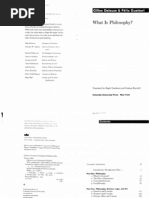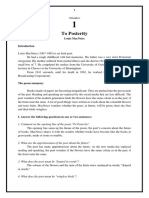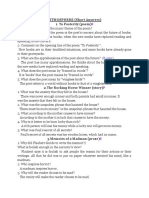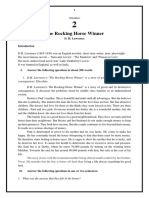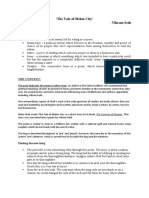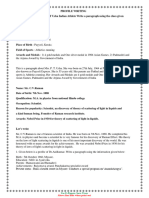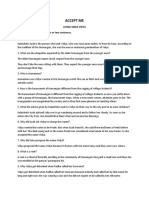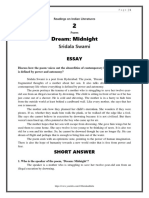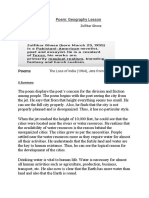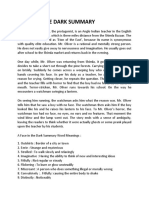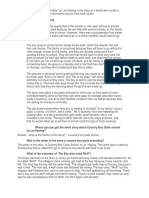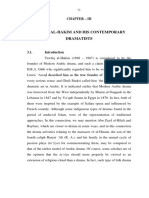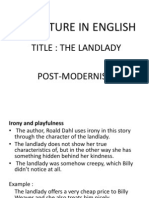Professional Documents
Culture Documents
Half A Day Naguib Mahfouz NOTES
Half A Day Naguib Mahfouz NOTES
Uploaded by
fireheart 17Original Description:
Original Title
Copyright
Available Formats
Share this document
Did you find this document useful?
Is this content inappropriate?
Report this DocumentCopyright:
Available Formats
Half A Day Naguib Mahfouz NOTES
Half A Day Naguib Mahfouz NOTES
Uploaded by
fireheart 17Copyright:
Available Formats
Half a Day
- short story -
Naguib Mahfouz
I. ESSAY
A critical appreciation of ‘Half a Day’ by Naguib Mahfouz.
OR
‘Half a Day’ as an allegory.
‘Half a Day’ is a short story by Nobel Prize-winning Egyptian writer, Naguib Mahfouz. It is
an allegory that describes the life-cycle of a man. The narrator begins the day as a little boy
entering school for the first time, but leaves as an old man in “half a day”.
It’s morning. A father is walking a little boy, the narrator, to school for the first
time. The boy struggles to keep pace with his father. The father says that the day marks an
important stage in the boy’s life. The boy becomes nervous. He feels that he is being
punished. His anxiety increases when he arrives at school.
The boy finds that children are divided into groups at school. A lady advises them to
accept school as their new home. The children enjoy the new environment. They attend
classes, play games, nap, and make new friends. As time goes on, they realize that the new
stage of their life involves hard work and frustration.
It’s evening. The narrator comes out of school. His father is not there waiting for
him. So, he tries to walk home. He meets a middle-aged man on the way. He also finds that
the city has changed dramatically since morning. The garden has disappeared. There are
crowds of people, cars, and tall buildings. A grandfather now, he is unable to cross a busy
street. He wonders when he would be able to cross.
The “half a day” spent in school is thus an allegory. The narrator enters the
schoolyard as a little boy and leaves it as a grandfather in “half a day”.
II. Answer the following questions in a sentence or two:
1. Why did the narrator wear new clothes?
The narrator wore new clothes because he was going to school for the first time.
2. Explain how the child challenges the idea of schooling.
The child would run towards his mother from time to time, as though appealing for help. He
also challenged his father: “Why school?” He said that he would never do anything to annoy
him.
3. "I was not convinced." Explain the child's thoughts on schooling.
The child believed that taking him away from the intimacy of his home was useless. He also
thought that throwing him into that huge school building that looked like a high-walled
fortress would not serve any purpose.
4. How did the father motivate the child when he hesitated to enter the class?
Gently pushing the child from him, the father asked him to be a man. He further said that the
child truly began life on that day. In this way, the father motivated the child.
5. Why did the boy feel like a stranger in the school?
The boy slowly entered the schoolyard but saw nothing. Gradually, the faces of boys and
girls came into view. He did not know any student, and none of them knew him. He felt like a
stranger.
6. What do you think about the teachers' attempt to console the children by calling school a
new home?
When the little children entered the schoolyard, some of them started crying. Then a lady
tried to console them saying, “This is your new home.” It’s in this way that teachers make
children feel comfortable.
7. The boy fumed happy after he found the rich variety in school. Comment.
The boy felt very happy at the rich variety in the school. Boys and girls met and made
friends. There were swings and other toys. The children practised music and language. They
enjoyed delicious food and nap.
8. What realizations made the narrator say, "We did not find it as totally sweet and unclouded
as presumed"?
Though life was exciting at school, it had its darker side as well. Dust-laden winds and
unexpected accidents occurred. So they had to be watchful and patient. Rivalries brought
pain, hatred and fighting. The lady sometimes scolded and punished them.
9. Write a short note on the narrative technique used by the author.
The author uses the first person narrative technique in the story, ‘Half a Day’. In this type of
narration, the narrator tells the story from his/her own point of view.
10. Why did the boy resist his father's attempt to send him to school? What made him ask the
question 'Why School'?
The boy resisted his father's attempt to send him to school because he did not want to leave
the intimacy of home. He thought that school was a place for punishment.
III. Answer in a paragraph:
1. Explain the use of 'home' as a symbol in the story.
‘Half a Day’ is an allegory that describes the life-cycle of a man. The “home” is used
as a powerful symbol of a seat of intimacy, love and warmth. The day opens as a father is
walking a little boy, the narrator, to school for the first time. From time to time, the child
would run towards his mother, as though appealing for help. He feels that he is being
punished. He also challenges his father: “Why school?” To him home is the place of comfort.
He does not like to be taken away from there.
2. The title of the story carries two edges of life. Explain.
The title, ‘Half a Day’ carries two edges of life. The story is an allegory. The narrator begins
the day as a young boy entering school for the first time. He leaves the schoolyard an old man
in only “half a day.” The boy is happy at school. Boys and girls meet and make friends. There
is entertainment, music, language, food, and nap. But it has its darker side as well. Dust-laden
winds and unexpected accidents occur. So, they should be watchful and patient. Rivalries
bring pain, hatred and fighting. The lady gives both carrot and stick.
3. "There was no question of ever returning to the paradise of home" - is it about the brevity
of human life? Comment.
The story 'Half a Day’ is an allegory. It shows the transience of life and the passage of
time. It traces the narrator's life from his time as a school boy till he becomes a grandfather.
Time passes so fast that he is taken back by the sudden transformation. The boy goes to
school and by the end of the day he tries to return home. He loses his way and is caught up in
a busy street unable to cross it. He will never return to the comfort of his home. The story is
about the brevity of life.
You might also like
- Jack Schaefer (1949) - Shane PDFDocument175 pagesJack Schaefer (1949) - Shane PDFYolandaBuarque34% (38)
- Stuck With You by Ali HazelwoodDocument4 pagesStuck With You by Ali Hazelwooddavina sanchezNo ratings yet
- Fifty Years of Malayalam Cinema COMPLETE NOTESDocument3 pagesFifty Years of Malayalam Cinema COMPLETE NOTESYahya Vk100% (2)
- Fire COMPLETE NOTESDocument3 pagesFire COMPLETE NOTESShifla.k75% (4)
- PURL Questions and AnswersDocument3 pagesPURL Questions and AnswersSHAHAN VS100% (6)
- Ma English ProjectDocument15 pagesMa English ProjectSubodh Sonawane100% (1)
- Deleuze & Guattari - What Is PhilosophyDocument134 pagesDeleuze & Guattari - What Is PhilosophyFernanda DrummondNo ratings yet
- The Summer of The Beautiful White HorseDocument15 pagesThe Summer of The Beautiful White Horseeilsel_0640% (5)
- Wrong Man in Workers' ParadiseDocument4 pagesWrong Man in Workers' ParadiseVIPIN MISHRA81% (37)
- The Ball PoemDocument17 pagesThe Ball PoemVandana Rawat100% (3)
- Sudha MurthyDocument7 pagesSudha MurthyNimai RoyNo ratings yet
- The Thief by Ruskin BondDocument2 pagesThe Thief by Ruskin BondTapaswee Dixit65% (20)
- Estonian LanguageDocument31 pagesEstonian LanguageDavidIsraelLeconaRodriguez100% (3)
- To A Reason Q&A - Arthur Rimbaud NOTES in PDFDocument2 pagesTo A Reason Q&A - Arthur Rimbaud NOTES in PDFummus100% (2)
- Poetry Marianne Moore NOTESDocument2 pagesPoetry Marianne Moore NOTESJain Jose100% (1)
- To Posterity Complete NotesDocument3 pagesTo Posterity Complete NotesHabisha Jassi93% (15)
- The Adventures of The Retired Colourman NOTESDocument4 pagesThe Adventures of The Retired Colourman NOTESAmeesha100% (1)
- A White Heron COMPLETE NOTESDocument6 pagesA White Heron COMPLETE NOTESmuhammed sunain67% (3)
- Memoirs of A Madman Gustave Flaubert NOTESDocument2 pagesMemoirs of A Madman Gustave Flaubert NOTESJain Jose100% (1)
- Lit Short Questions PDFDocument8 pagesLit Short Questions PDFAswanth Shaji Cv100% (1)
- The Rocking Horse Winner Complete NotesDocument3 pagesThe Rocking Horse Winner Complete NotesJain Jose100% (2)
- Accept Me - Vidya Complete NotesDocument4 pagesAccept Me - Vidya Complete NotesArsharasheed ArsharasheedNo ratings yet
- SN GURU Atmopadesasatakam COMPLETE NOTESDocument2 pagesSN GURU Atmopadesasatakam COMPLETE NOTESMehrin Mersiha100% (2)
- Tiger in A ZooDocument11 pagesTiger in A Zooarnavgupta100% (1)
- 10 English - A Tiger in The Zoo - NotesDocument3 pages10 English - A Tiger in The Zoo - NotesYash Modanwal100% (5)
- The Ball Poem - Study NotesDocument4 pagesThe Ball Poem - Study Notesramya anil nairNo ratings yet
- BirthDocument4 pagesBirthAshik Meerankutty100% (2)
- A Photograph Poetic DevicesDocument1 pageA Photograph Poetic Devicesmidhulajk50% (2)
- Keeping Quiet LPDocument2 pagesKeeping Quiet LPratnapathak75% (4)
- The Tale of Melon CityDocument3 pagesThe Tale of Melon Cityratnapathak100% (3)
- Profile WritingDocument3 pagesProfile Writingmallukatageri31No ratings yet
- Home They Brought Her Warrior DeadDocument10 pagesHome They Brought Her Warrior Deadyanetangelicasegoviaortes100% (3)
- Accept MeDocument5 pagesAccept MeHawkz GamingNo ratings yet
- 1691059810READINGS ON KERALA DOT NOTES PDFDocument23 pages1691059810READINGS ON KERALA DOT NOTES PDFMehrin MersihaNo ratings yet
- Notes - Poem 4. Communication.Document2 pagesNotes - Poem 4. Communication.Eunice Gabriella Kennedy100% (1)
- Lesson Plan The Trees Class XDocument5 pagesLesson Plan The Trees Class Xkshipra khajuriaNo ratings yet
- KEEPING QUIET-SAQs, Poetic DevicesDocument8 pagesKEEPING QUIET-SAQs, Poetic Devicesdakshrwt06No ratings yet
- Cbcss Report of The Literary Club ActivitiesDocument5 pagesCbcss Report of The Literary Club ActivitiesNandhini Rangavel100% (1)
- Poykayil Appachan COMPLETE NOTESDocument3 pagesPoykayil Appachan COMPLETE NOTESRanisha mol EP100% (3)
- Dream Midnight COMPLETE NOTESDocument3 pagesDream Midnight COMPLETE NOTESGayathri LakshmiNo ratings yet
- A Tiger For Malgudi PDFDocument7 pagesA Tiger For Malgudi PDFSree Ranjani Krishnan0% (1)
- Geography Lesson - PoemDocument6 pagesGeography Lesson - PoemSowjanyaNo ratings yet
- KUTTIPPURAM BRIDGE Complete NotesDocument9 pagesKUTTIPPURAM BRIDGE Complete NotesNimmy100% (3)
- Ghoshayatra COMPLETE NOTESDocument3 pagesGhoshayatra COMPLETE NOTESMehrin Mersiha50% (2)
- History Lesson COMPLETE NOTESDocument3 pagesHistory Lesson COMPLETE NOTESSandra Satheesh100% (1)
- The Rebel PDFDocument2 pagesThe Rebel PDFRaji AnilNo ratings yet
- Unit 2 - The Legends of KhasakDocument26 pagesUnit 2 - The Legends of KhasakSaket Choudhary100% (3)
- ENG2A04 Study Material-1Document62 pagesENG2A04 Study Material-1Juneesh Juni100% (1)
- CBSE: Assessment of Speaking and Listening Skills (ASL) : Class - IX Code IX-L-03 Listening Test Task - 1Document3 pagesCBSE: Assessment of Speaking and Listening Skills (ASL) : Class - IX Code IX-L-03 Listening Test Task - 1vickyji125No ratings yet
- Rain On The RoofDocument20 pagesRain On The Roofajeeth btNo ratings yet
- We Are Not Afraid To Die Important Question and AnswersDocument4 pagesWe Are Not Afraid To Die Important Question and AnswersAnudeex Shetty70% (20)
- How To Tell Wild Animals PPT-1Document26 pagesHow To Tell Wild Animals PPT-1bluebell100% (7)
- Grandmother's HouseDocument18 pagesGrandmother's Housepriyanka rNo ratings yet
- Dear Ijeawele Essays, Short AnwerDocument3 pagesDear Ijeawele Essays, Short Anwerjishnupg2005No ratings yet
- A Face in The Dark SummaryDocument12 pagesA Face in The Dark Summarydipanajn100% (1)
- A Shady PlotDocument3 pagesA Shady PlotRatnaPathak50% (2)
- On Shaking Hands by A.G. GardinerDocument7 pagesOn Shaking Hands by A.G. Gardinerhariprasadm58% (12)
- My Mother at Sixty SixDocument82 pagesMy Mother at Sixty Sixg.srinivasarao100% (1)
- A LIVING GOD - Koizumi YakumoDocument5 pagesA LIVING GOD - Koizumi YakumoFahad S RahumanNo ratings yet
- LESSON PLAN The BROOK Lesson Title The Brook by Alfred Lord Tennyson Sub Topic Understanding The Theme, Imagery, and Poetic Devices in The Brook' Lesson Duration 1 Hour 30 Minutes Learning ObjecDocument9 pagesLESSON PLAN The BROOK Lesson Title The Brook by Alfred Lord Tennyson Sub Topic Understanding The Theme, Imagery, and Poetic Devices in The Brook' Lesson Duration 1 Hour 30 Minutes Learning ObjecRekha Shukla100% (1)
- 21st Century LIterature From The Philippines and The WorldDocument6 pages21st Century LIterature From The Philippines and The WorldMclin Jhon Marave MabalotNo ratings yet
- Half A Day AnalysisDocument4 pagesHalf A Day AnalysisAnjel Rhada Mae EstoestaNo ratings yet
- Question and AnswersDocument3 pagesQuestion and Answersshetty67% (3)
- The Country Boy Who Quits SchoolDocument4 pagesThe Country Boy Who Quits SchoolAngel TabuenaNo ratings yet
- PS Module 2Document25 pagesPS Module 2fireheart 17No ratings yet
- CC PoliticalDocument1 pageCC Politicalfireheart 17No ratings yet
- What Are Transitive VerbsDocument12 pagesWhat Are Transitive Verbsfireheart 17No ratings yet
- Social and Cultural History of BritainDocument18 pagesSocial and Cultural History of Britainfireheart 17No ratings yet
- ArticlesDocument4 pagesArticlesfireheart 17No ratings yet
- What Are The 16 Punctuation Marks in English GrammarDocument18 pagesWhat Are The 16 Punctuation Marks in English Grammarfireheart 17100% (1)
- Character of HesterDocument1 pageCharacter of Hesterfireheart 17No ratings yet
- About DALIT Literature NOTES-1Document3 pagesAbout DALIT Literature NOTES-1fireheart 17No ratings yet
- Dalit StudiesDocument35 pagesDalit Studiesfireheart 17No ratings yet
- Poetic FormsDocument15 pagesPoetic Formsfireheart 17No ratings yet
- How Many More DaysDocument3 pagesHow Many More Daysfireheart 17100% (2)
- Edgar Allan Poe ThesisDocument6 pagesEdgar Allan Poe Thesisafjrqxflw100% (2)
- Tawfeeq Al Hakim and His Contemporary DramatistsDocument23 pagesTawfeeq Al Hakim and His Contemporary DramatistsDr showkat ahmed shahNo ratings yet
- International Yoga Day Notice 2022Document2 pagesInternational Yoga Day Notice 2022Jatin NasaNo ratings yet
- Total Quality Management in The Health-Care Context (Integrating The Literature and Directing Future Research)Document11 pagesTotal Quality Management in The Health-Care Context (Integrating The Literature and Directing Future Research)Adellianinda PratamaNo ratings yet
- Storytelling CinderellaDocument6 pagesStorytelling CinderellaNabila channelNo ratings yet
- Literature in English: Title: The Landlady Post-ModernismDocument8 pagesLiterature in English: Title: The Landlady Post-ModernismRohana Hamzah100% (1)
- Research Paper 2Document4 pagesResearch Paper 2Ravi RajamanickamNo ratings yet
- The Laburnum TopDocument20 pagesThe Laburnum TopKirtikaNo ratings yet
- Introduction To Postcolonial LiteratureDocument5 pagesIntroduction To Postcolonial LiteratureYasir Daud KhanNo ratings yet
- Andor-Moria ENDocument7 pagesAndor-Moria ENSavvasNo ratings yet
- 12 - Chapter 4.pdf JhumurDocument28 pages12 - Chapter 4.pdf JhumurSURAJIT BHATTACHARJEENo ratings yet
- TranslationDocument8 pagesTranslationNaveen Jyothish BabuNo ratings yet
- Othello Character Activity Act 1 - ConfortiDocument4 pagesOthello Character Activity Act 1 - Confortihibba.syed.063No ratings yet
- Onoma 53 1.2. Dvorakova FinalDocument17 pagesOnoma 53 1.2. Dvorakova FinalPavla xNo ratings yet
- GriffonfordDocument1 pageGriffonfordj-handNo ratings yet
- Poem Excerpts: Selection From Farid Ud-Din Attar's The Conference of The BirdsDocument8 pagesPoem Excerpts: Selection From Farid Ud-Din Attar's The Conference of The BirdsMaria RădulescuNo ratings yet
- Philippine Literature FinalsDocument7 pagesPhilippine Literature FinalsLeiNo ratings yet
- 21st LitDocument18 pages21st LitKristel Kate Melchor TugadeNo ratings yet
- BookmarksDocument8 pagesBookmarks1krishnagopalNo ratings yet
- Macbeth Dominoes One Activity KeyDocument2 pagesMacbeth Dominoes One Activity KeyLera Kozinets100% (1)
- Unseen Fog by Carl Sandburg How Does The Poet Presents FogDocument3 pagesUnseen Fog by Carl Sandburg How Does The Poet Presents FoghikdsenNo ratings yet
- LP Elem and Hs Week 9Document8 pagesLP Elem and Hs Week 9Diether Mercado PaduaNo ratings yet
- Loving in Truth"Document2 pagesLoving in Truth"Aditya SonuNo ratings yet
- Poetry Workshop Lesson PlanDocument2 pagesPoetry Workshop Lesson Planapi-324016785No ratings yet
- Lesson 2Document8 pagesLesson 2Larie CanoNo ratings yet
- Tatarkiewicz ReminiscencesDocument10 pagesTatarkiewicz ReminiscencesRafael París RestrepoNo ratings yet






